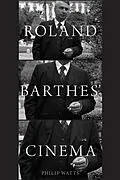The most famous name in French literary circles from the late 1950s till his death in 1981, Roland Barthes maintained a contradictory rapport with the cinema. As a cultural critic, he warned of its surreptitious ability to lead the enthralled spectator toward an acceptance of a pre-given world. As a leftist, he understood that spectacle could be turned against itself and provoke deep questioning of that pre-given world. And as an extraordinarily sensitive human being, he relished the beauty of images and the community they could bring together.
Autorentext
Philip Watts was Professor of French at Columbia University and Chair of the department from 2008 to 2012.
Inhalt
Editors' Preface Introduction Chapter One - A Degraded Spectacle Chapter Two - Refresh the Perception of the World Chapter Three - Barthes and Bazin Chapter Four- Another Revolution Chapter Five - Exiting the Movie Theater Chapter Six - The Melodramatic Imagination Conclusion - From Barthes to Rancière? Interview With Jacques Rancière Nine Texts on the Cinema by Roland Barthes Barthes and Cinema: A Bibliography Index
